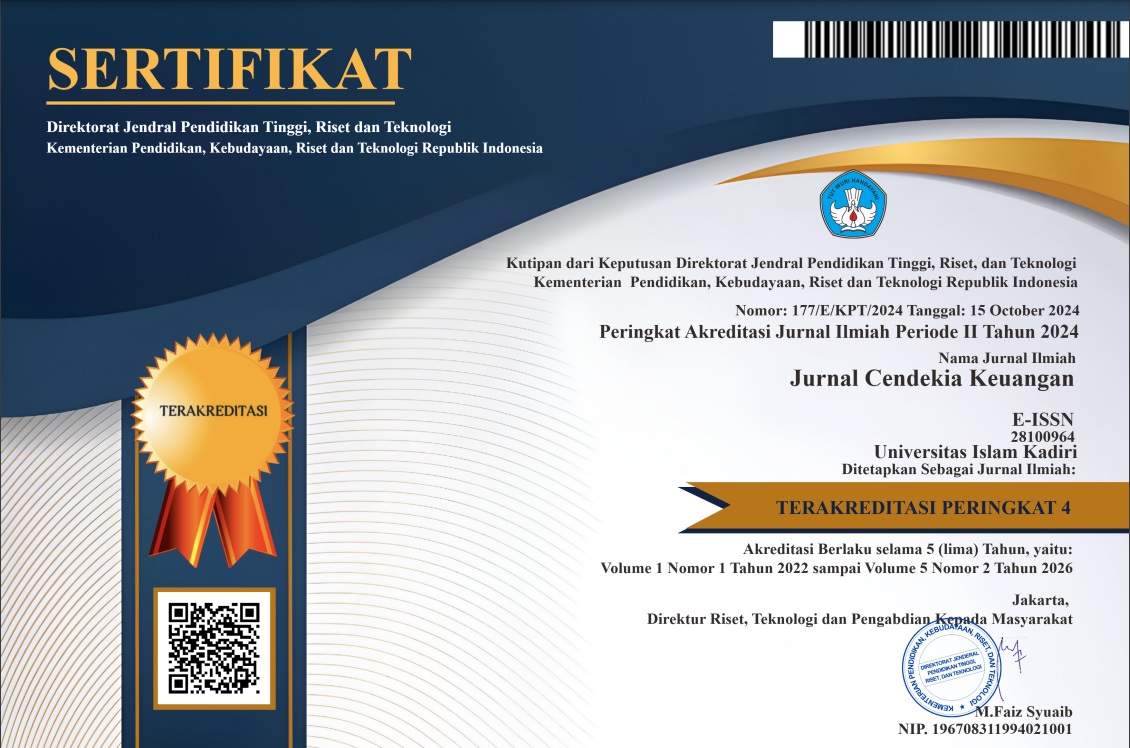Financial Distress Using the Zmijewski, Grover, and Springate Models at Retail Business in Indonesia
Abstract
Introduction/Main Objectives: This study aims to analyze PT Matahari Putra Prima's financial health during 2018-2022 using the Zmijewski, Grover, and Springate models to predict potential financial distress. Background Problems: When a company experiences bankruptcy, its financial statements must be evaluated and measured through in-depth research. PT Matahari Putra Prima Tbk, a major player in Indonesia's retail industry, has faced significant challenges over the past few years due to shifts in consumer behavior towards online shopping and the economic impacts of COVID-19. Novelty: This research fills the gap in financial distress in retail businesses in Indonesia. Research Methods: This study uses a descriptive quantitative approach. The financial data of PT Matahari Putra Prima Tbk from 2018 to 2022, obtained through documentation and literature review, were analyzed using three financial distress models: Zmijewski, Grover, and Springate. The sampling technique is a sampling technique to be used in research. The sampling design of this study uses nonprobability sampling. Nonprobability sampling can provide very useful information for a population. Following this study, the author will use the purposive sampling technique. Finding/Results: PT Matahari Putra Prima Tbk for five years for 2018 – 2022 using Zmijewski, Grover, and Springate indicated that the company was experiencing Financial Distress. Research limitation/implications: It is better for PT. Matahari Putra Prima Tbk evaluates financial performance to bring the company to a better state. The company's value that shows the risk of financial distress, PT Matahari Putra Prima Tbk, focuses more on improving operational efficiency and reducing costs in improving cash management and reducing short-term debt to reduce the risk of financial distress. Furthermore, maintain good communication with investors and stakeholders to build trust and support.
References
Hajek, P., & Munk, M. (2024). Corporate financial distress prediction using the risk-related information content of annual reports. Information Processing and Management, 61(5). https://doi.org/10.1016/j.ipm.2024.103820
Hariyani, D. S., & Sujianto, A. (2018). Analisis Perbandingan Model Altman, Model Springate, dan Model Zmijewski dalam Memprediksi Kebangkrutan Bank Syariah di Indonesia. Inventory: Jurnal Akuntansi, 1(2), 13–23.
Hery, S. E. (2016). Analisis Laporan Keuangan-Integrated and Comprehensive Edition. Gramedia Widiasarana Indonesia.
Indrawan, A., & Gusmarani, Z. (2023). Analisis Penggunaan Metode Altman Z-Score, Zmijewski, Groverm Springate Dan Taffler Dalam Memprediksi Financial Distress (Studi Empiris Pada Perusahaan Perhotelan Yang Terdaftar Di Bursa Efek Indonesia 2021-2022). Konferensi Ilmiah Akuntansi (KIA 10), 1–12.
Irfani, A. S. (2020). Manajemen Keuangan dan Bisnis; Teori dan Aplikasi. Gramedia Pustaka Utama.
Iswahyudi, M. (2022). Zmijewski, Taffler, Springate dan Grover Model: Analisis Model Prediksi Kebangkrutan. Ekuitas: Jurnal Pendidikan Ekonomi, 10(1), 129–137.
Jannah, M. N., & Kusumawardani, M. R. (2024). Model prediksi kebangkrutan dengan zmijewski untuk perusahaan subsektor pariwisata, restoran, dan hotel. Jurnal Cendekia Keuangan; Vol 3 No 2 (2024): OktoberDO - 10.32503/Jck.V3i2.4485 . https://ejournal.uniska-kediri.ac.id/index.php/JCK/article/view/4485
Marsenne, M., Ismail, T., Taqi, M., & Hanifah, I. A. (2024). Financial distress predictions with Altman, Springate, Zmijewski, Taffler and Grover models. Decision Science Letters, 13(1), 181–190. https://doi.org/10.5267/j.dsl.2023.10.002
Nozharov, S., & Hristozov, Y. (2023). Effects on the Business in the Conditions of Superior Crises. ECONOMICS - Innovative and Economics Research Journal, 11(1), 235–243. https://doi.org/10.2478/eoik-2023-0014
Piscestalia, N., & Priyadi, M. P. (2019). Analisis Perbandingan Model Prediksi Financial Distress Dengan Model Springate, Ohlson, Zmijewski, Dan Grover. Jurnal Ilmu Dan Riset Akuntansi (JIRA), 8(6).
Prasetianingtias, E., & Kusumowati, D. (2019). Analisis perbandingan model Altman, Grover, Zmijewski dan Springate sebagai prediksi financial distress. Jurnal Akuntansi Dan Perpajakan, 5(1), 1–3.
Prihanthini, N., & Sari, M. M. R. (2013). Prediksi Kebangkrutan Dengan Model Grover, Altman Z-Score, Springate Dan Zmijewski Pada Perusahaan Food And Beverage Di Bursa Efek Indonesia. E-Jurnal Akuntansi Universitas Udayana, 5(2), 417–435.
Putri, M. A., & Maulana, H. Z. (2023). Memprediksi kebangkrutan menggunakan Altman Z-Score pada perusahaan manufaktur sektor makanan dan minuman. Jurnal Cendekia Keuangan; Vol 2 No 2 (2023): OktoberDO - 10.32503/Jck.V2i2.3431.
Rahim, R., Anggriani, P., & Wiranda, N. A. (2024). The Impact of the Board, Political Connections on Financial Distress in Indonesia: Effects of Corporate Governance. International Journal of Business, 29(1). https://doi.org/10.55802/IJB.029(1).001
Rahmi, A., Lu, C.-C., Liang, D., & Fadilah, A. N. (2024). Splitting long-term and short-term financial ratios for improved financial distress prediction: Evidence from Taiwanese public companies. Journal of Forecasting, 43(7), 2886–2903. https://doi.org/10.1002/for.3143
Rizki, A., Nasih, M., & Putri, F. V. (2024). Working environmental quality and financial distress: evidence from Indonesia. Cogent Business and Management, 11(1). https://doi.org/10.1080/23311975.2023.2292813
Sayidah, N., & Assagaf, A. (2020). Assessing variables affecting the financial distress of state-owned enterprises in Indonesia (Empirical study in non-financial sector). Business: Theory and Practice, 21(2), 545–554. https://doi.org/10.3846/btp.2020.11947
Springate, G. L. . (1978). Predicting the Possibility of Failure in a Canadian Firm: A Discriminant Analysis. Simon Fraser University.
Sun, B., Zhang, Y., Zhu, K., Mao, H., & Liang, T. (2024). Is faster really better? The impact of digital transformation speed on firm financial distress: Based on the cost-benefit perspective. Journal of Business Research, 179. https://doi.org/10.1016/j.jbusres.2024.114703
Wahyuningsih, T., & Venusita, L. (2022). Financial Analysis of Retail Companies Using the Altman, Springate, Zmijewski, Fulmer, and Grover Bankruptcy Prediction Models. Journal of Accounting, Entrepreneurship and Financial Technology (Jaef), 3(2), 149–168. https://doi.org/10.37715/jaef.v3i2.2661
Wang, J., Jiang, C., Zhou, L., & Wang, Z. (2024). Assessing financial distress of SMEs through event propagation: An adaptive interpretable graph contrastive learning model. Decision Support Systems, 180. https://doi.org/10.1016/j.dss.2024.114195
Wang, S., & Chi, G. (2024). Cost-sensitive stacking ensemble learning for company financial distress prediction. Expert Systems with Applications, 255. https://doi.org/10.1016/j.eswa.2024.124525
Zmijewski, M. E. (1984). Methodological Issues Related to the Estimation of Financial Distress Prediction Models. Journal of Accounting Research, 22, 59–82. https://doi.org/http://dx.doi.org/10.2307/2490859

This work is licensed under a Creative Commons Attribution-ShareAlike 4.0 International License.
















